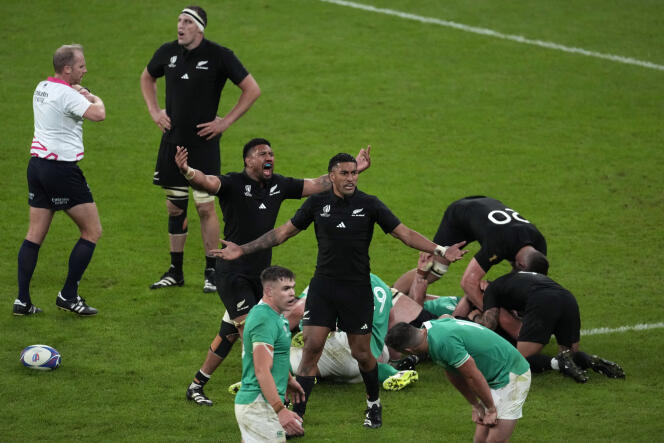


They had been buried, relegated to the ranks of the ordinary teams, judged incapable of derailing an Irish team on its way to a first-ever World Cup semi-final. They were said to be outdated, flimsy and lacking in their ruthless attacking game.
And yet, the All Blacks, in triumphing over Ireland (28-24) at the end of one of the most memorable games in the competition's history, showed, on Saturday, October 14, at the Stade de France, that this black-clad team never really dies.
In the days and weeks leading up to this confrontation, it seemed as if history had already been written: Ireland, the world's leading nation on the strength of 17 consecutive victories, confident in its qualities and its rugby, was going to get the better of New Zealand thanks to its well-oiled, relentless and oft-repeated game. It was the culmination of sporting logic and the heralded triumph of the Northern Hemisphere, virtually a passing of the baton between two of the most dominant teams of the last 15 years. Before the match, the deafening Irish chants from the Stade de France stands made the traditional New Zealand haka inaudible.
Until the final minutes of the match, this story could still be written. The Irish had the ball under their arm and were only four points behind. To secure their place in the semi-finals, all they had to do was reach the New Zealand line, more than sixty meters away, and score a try.
At the 77th-minute mark, Ireland began its steamroller of relentless attacks on the opposition line, the kind that usually dries out lungs, burns thighs and shatters defenses. For over five minutes and a stratospheric 37 phases of play, the green waves pushed back the black line, meter by meter.
During those five minutes, the two teams engaged in a battle that will be cited as an example for many years to come. The Stade de France seemed to have run out of oxygen. The 78,000 spectators likely sensed that the fate of the match hung by a thread, a shaky hand, an ill-assured pass, an over-pressured tackle.
For more than 300 seconds of overpowering charges and desperate defense, no team let go or committed a foul. Until New Zealand's Sam Whitelock, 151 caps, plunged his big hands into the heart of yet another ruck to win the ball back, definitively shatter the Irish dream and send his side through to the semi-finals on Friday, October 20 at the Stade de France.
There were dozens of details throughout the match that cost the Irish the match. But the men in green will undoubtedly long regret the first minutes on the pitch when they let the New Zealanders go to the front.
You have 42.85% of this article left to read. The rest is for subscribers only.
